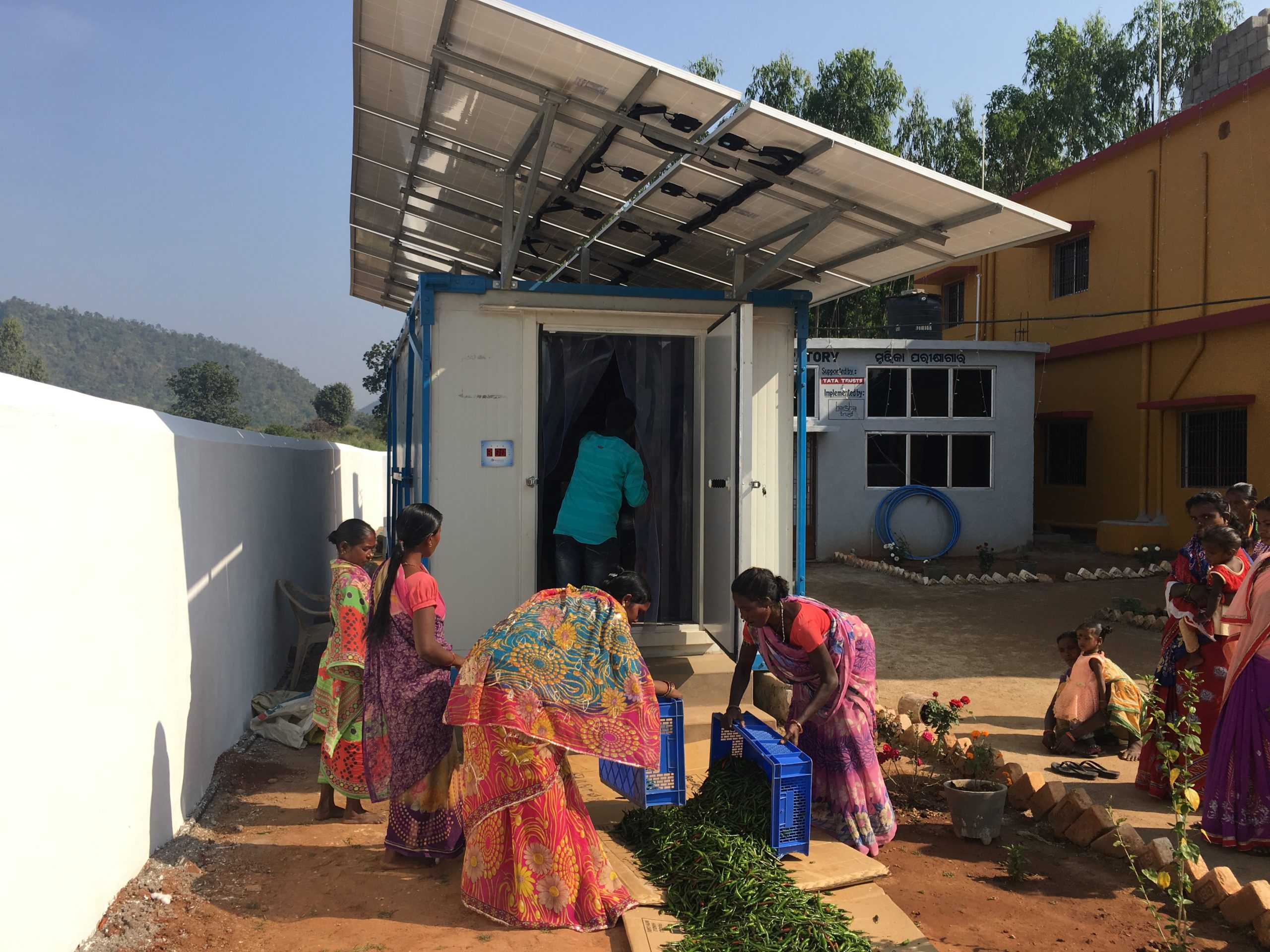Background
Markoma Women Farmer Producer company is an all women FPO formed and supported by Harsha Trust which has 460+ registered farmer members. They are all vegetable growers and were suffering losses due to untimely reach of produce to the market and the fluctuating market rates. A solar powered cold storage unit was installed in the Harsha Trust training and livelihood centre in the region for the FPO farmer members to avoid for this loss.
Technological Solution
The selected technical solution was the 5 MT Ecozen cold storage. Based on understanding the inputs, outputs and markets, type of produce and their cooling requirements, this cold storage was piloted. The 5 MT solar powered decentralized cold storage was installed in September, 2018 and its operations were designed as a service model. However, due to the farmers not being able to fill the entire cold storage to capacity on a daily basis, traders and vendors also were brought in to store their commodities.

Linkages
The FPO owns the cold storage, procures the produce from farmer members and vendors who pay a price of INR 2 per kg to store. The rate is fixed irrespective of the amount of time the farmers want to store for. Meanwhile, through promotional activities, the FPO identified 40 vendors in the nearest big market, out of which 12 were active suppliers who signed up to be regular vendors for them. They go from village to village or straight to the cold storage to deposit and gather the produce. The farmers have been divided into two categories: farmers with land holding below half acre and above half acre. Most farmers accessing the cold storage are the ones with land holding above half acre as they are able to produce good volumes to store and sell to the FPO directly as well. The vendors procure the supply from the farmers, leave it in the cold storage as farmers cannot do it themselves due to lack of transportation in these remote regions. The FPO has signed an agreement with the vendors to have a fixed price on produce based on seasons allowing farmers to not incur losses or waste produce as the cold storage also helps them. This was a mobilized effort by an FPO association which is a coalition of FPOs promoted by local NGOs from across districts like Muniguda, Bissamcuttack. This was formed to protect farmers from middle men and malpractices.

Financial Solution and Business Model
With a 5 MT capacity and for the business to be viable, there has to be a 5 quintal daily. This translates to INR 1000 per day business (INR 2 per kg rental) and an income of INR 30,000 per month. If INR 3.6 lakhs is generated as income, the cold storage will be paid back in 5 years. As the previous model with just FPO farmer members using the cold storage was not viable, the service was extended to vendors as well which encouraged building a relationship with them benefitting the farmers.
Learnings
Due to COVID-19 induced lockdowns, to avoid any losses and food insecurity, the vendors were asked to collect all the produce and fill the cold storage with 3.5 MT of produce. The produce was housed in the cold storage for over a week.
With the existing FPO members, the cold storage was being underutilized. This led to the FPO working on increasing their productivity and in changing cropping patterns which helped farmers with having the backing of a cold storage. Along with better vendor relations and collections, it is now being stocked to capacity.
Pre Intervention scenario
The FPO's primary income before intervention was selling agricultural inputs to farmers such as seeds, fertilizers and cultivation of vegetables and selling. They did not have regularized business. The produce grown by farmers includes tomatoes, brinjal, bitter gourd, cucumber, parwal, water melon, beans etc. Bitter gourd grows through the year, tomatoes in the monsoons and the remaining are kharif and rabi crops. The key issues facing farmers was the volatility of prices in the markets affecting their incomes. Wastage was another issue as farmers would not have the option to store leading them to either selling at low rates or letting the produce go to waste.
About the Partner
Harsha Trust works with tribal and vulnerable communities across remote regions of Odisha, aiming to bring in human development in challenging conditions. They intervene on basic needs of food self-sufficiency and livelihoods. The organization has over the past 10 years tried to demonstrate models of sustainable livelihoods that arrest migration and give people a chance to develop within their circumstances. Harsha trust is working with more than 89,000 families spreading over around 1,500 villages in 19 blocks of 7 districts of south and western Odisha
Impact
Strong relationship established with vendors: Due to this, farmers do not have to struggle with price volatility. With the cold storage, produce can remain unaffected a longer time. This agreement with the vendors, allows for farmers to receive a fixed (and agreed upon) price for their produce throughout the year, the farmers have remained unaffected even during lockdown.
Productivity increased, wastage decreased: Due to cropping patterns, productivity has increased and due to the cold storage wastage has reduced. Per farmer who harvests 100 kg, 40% loss was happening out of which 20% was wastage/glut. The remaining 20 kgs was due to price fluctuation. This 40% loss has been minimized.
Awareness on solar: A lot of the visiting communities are seeing solar energy for the first time and have learnt of its existence, uses and applications beyond just lighting.
FPO income: The FPO is seeing regular income for the first time. It only had trading income before by selling seed input and vegetable cultivation and selling.
